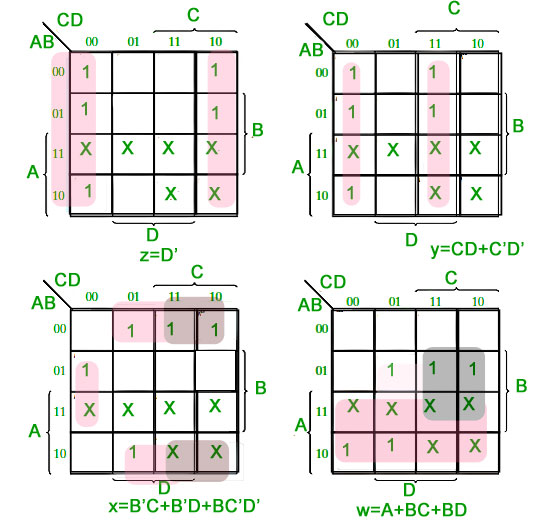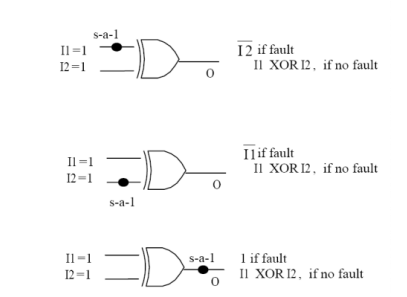Detection of SAO faults on selected I/O wires of a VLSI circuit for BCD-to-excess-3 code converter
Introduction
BCD to Excess-3
As is clear by the name, a BCD digit can be converted to it’s corresponding Excess-3 code by simply adding 3 to it. Let A, B, C and D be the input bits and W, X, Y and Z be the output bits. Then the truth table for the conversion from BCD to Excess-3 is as follows:
| BCD Code (INPUT) | Excess 3 Code (OUTPUT) | ||||||
|---|---|---|---|---|---|---|---|
| A | B | C | D | W | X | Y | Z |
| 0 | 0 | 0 | 0 | 0 | 0 | 1 | 1 |
| 0 | 0 | 0 | 1 | 0 | 1 | 0 | 0 |
| 0 | 0 | 1 | 0 | 0 | 1 | 0 | 1 |
| 0 | 0 | 1 | 1 | 0 | 1 | 1 | 0 |
| 0 | 1 | 0 | 0 | 0 | 1 | 1 | 1 |
| 0 | 1 | 0 | 1 | 1 | 0 | 0 | 0 |
| 0 | 1 | 1 | 0 | 1 | 0 | 0 | 1 |
| 0 | 1 | 1 | 1 | 1 | 0 | 1 | 0 |
| 1 | 0 | 0 | 0 | 1 | 0 | 1 | 1 |
| 1 | 0 | 0 | 1 | 1 | 1 | 0 | 0 |
From the truth table above, we draw the K-Maps for each of the output variables W, X, Y and Z.

Stuck At Faults
A stuck-at fault (SAF) is a logic-level fault. Stuck at faults occur when a line is permanently stuck to Vdd or ground giving a faulty output. This line may be an input or output to any gate. Also this fault can be single or multiple stuck at faults.
There are two kinds of SAF:- Stuck At 0
- Stuck At 1
When a signal, or gate output, is stuck at a 0 or 1 value, independent of the inputs to the circuit, the signal is said to be "stuck at" and the fault model used to describe this type error is called a "stuck at fault model".
A circuit with n lines can have (3n)-1 possible stuck line combinations. Each line can be Stuck At 0, Stuck At 1 or No Fault.
Examples of Stuck At 1 Faults for XOR gate

